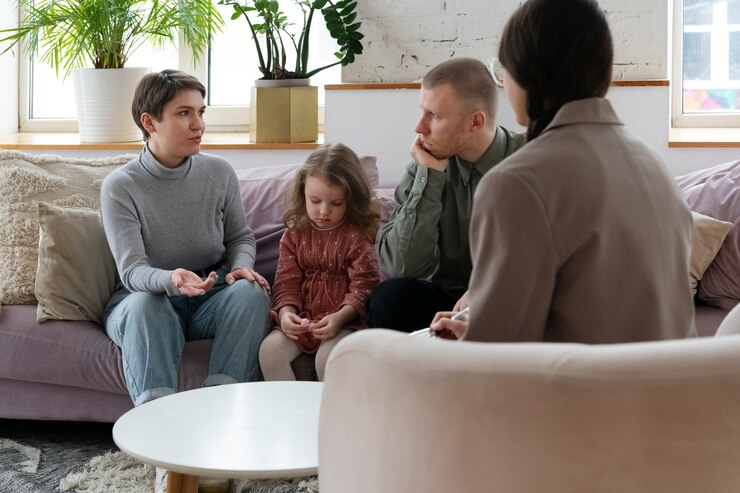Family. It’s the foundation on which we build our lives, a source of love, support, and sometimes, frustration. But even the strongest families can face challenges that strain communication and lead to conflict. This is where family therapy comes in, offering a powerful tool to mend broken connections and foster a more harmonious home environment.
What is Family Therapy?
Family therapy delves deeper than simply improving communication within a household. It’s a specialized form of psychotherapy that acts as a catalyst for positive change within the family system. Here’s a closer look at what family therapy entails:
Systems Approach: Family therapy operates from a systemic perspective. This means the therapist views the family as an interconnected unit, where the actions and behaviors of one member impact the entire system. By understanding these family dynamics, the therapist can identify patterns that contribute to conflict or dysfunction.
Exploration of Family Dynamics: During sessions, the therapist facilitates open communication, allowing family members to express their perspectives, feelings, and experiences. This exploration helps uncover underlying issues, hidden resentments, and unhealthy communication patterns that may be hindering the family’s well-being.
Collaborative Goal Setting: Family therapy is a collaborative effort. The therapist works with all family members to establish clear and realistic goals for therapy. These goals may be centered on improving communication, resolving specific conflicts, or developing healthier coping mechanisms for stressful situations.
Focus on Strengths: While acknowledging challenges, family therapy emphasizes the family’s strengths and positive interactions. The therapist helps families build on these strengths to navigate future difficulties more effectively.
Why Consider Family Therapy?
Family therapy offers a powerful solution for several challenges that families encounter. Here’s a deeper dive into why you might consider family therapy, exploring the specific benefits it offers for various situations:
Communication Issues:
Many families struggle with expressing emotions clearly, leading to misunderstandings and hurt feelings. Family therapy equips families with essential communication skills. This includes:
Active Listening: Therapists teach families to truly listen to each other, paying attention to verbal and nonverbal cues. This fosters empathy and understanding.
“I” Statements: Family members learn to express their needs and feelings using “I” statements, taking ownership of their emotions and avoiding accusatory language.
Validation: Therapists help families validate each other’s feelings, even if they disagree with the underlying issue. This creates a safe space for open communication.
Conflict Resolution:
Disagreements are natural in any family. However, unresolved conflicts can fester and become toxic. Family therapy provides tools for navigating conflict constructively. This includes:
Problem-Solving Techniques: Therapists teach families to identify the root cause of the conflict, and then work together to brainstorm solutions that address everyone’s needs.
Compromise: Family members learn the art of compromise, finding solutions that may not be ideal for everyone but are acceptable to all.
Healthy Debate: Therapists can help families engage in healthy debate, encouraging respectful communication and the expression of differing viewpoints.
Life Transitions:
Major life changes like job loss, illness, relocation, or the addition of a new family member can be stressful for everyone. Family therapy can equip families with coping mechanisms to navigate these transitions. This includes:
Stress Management Techniques: Therapists teach families healthy coping mechanisms for dealing with stress, such as relaxation techniques, communication exercises, and building a support network.
Adjusting Expectations: Family therapy can help families adjust their expectations during transitions, fostering understanding and patience as they adapt to new circumstances.
Grief and Loss Support: If a family is experiencing loss, therapy can provide a safe space to grieve together and develop healthy coping mechanisms.
Mental Health Concerns:
If a family member is struggling with a mental health issue like depression, anxiety, or addiction, family therapy can provide support for the entire family. This includes:
Psychoeducation: Therapists educate families about the specific mental health condition, helping them understand its symptoms and treatment options.
Communication Strategies: Family therapy can equip families with communication skills to effectively support their loved ones and navigate difficult conversations.
Boundary Setting: Therapists can help families establish healthy boundaries to protect themselves while offering support to their loved ones.
Behavioral Problems:
Children and adolescents may exhibit challenging behaviors like defiance or aggression. Family therapy can help identify the root causes of these behaviors and develop strategies for positive reinforcement. This includes:
Behavioral Analysis: Therapists work with families to understand the triggers and consequences associated with the challenging behavior.
Positive Reinforcement Techniques: Family therapy teaches families to use positive reinforcement, rewarding desired behaviors to encourage positive change.
Parenting Skills Development: Therapists can assist parents in developing effective parenting skills to manage challenging behaviors and promote emotional well-being in their children.
What to Expect in Family Therapy Sessions

Family therapy sessions provide a unique opportunity for families to come together in a safe and supportive environment. Here’s a closer look at what you can expect during these sessions:
Structure and Participants:
Family Composition: While typically involving immediate family members (parents and children), depending on the situation, extended family members like grandparents, aunts, or uncles may also be included in the sessions. The therapist will determine the most beneficial combination for addressing the family’s needs.
Session Structure: Family therapy sessions typically last 45-60 minutes and occur weekly or bi-weekly. The therapist will establish a comfortable routine, allowing for individual and group discussions.
Creating a Safe Space:
Neutral Ground: The therapist acts as a neutral facilitator, ensuring all family members feel comfortable expressing their thoughts and feelings without judgment.
Confidentiality: Similar to other forms of therapy, confidentiality is a cornerstone of family therapy. The therapist will discuss the boundaries of confidentiality at the outset, but generally, what is discussed in the session remains private within the family unit. Exceptions may exist for safety concerns or legal mandates, which the therapist will explain clearly.
Therapeutic Techniques:
Family therapists employ several techniques to address specific challenges and foster communication. Here are some commonly used methods:
Genograms: These visual family trees map out family history across generations, including significant events, relationships, and potential patterns. By examining these patterns, the therapist can identify how past experiences may be influencing current family dynamics.
Circular Questioning: This technique involves the therapist asking questions in a circular manner, where family members respond directly to each other. This encourages active listening, empathy building, and a deeper understanding of different perspectives within the family.
Role-Playing: Therapists may utilize role-playing exercises to simulate real-life scenarios, such as difficult conversations or conflict situations. This allows families to practice communication skills and identify areas for improvement in a safe, controlled environment.
Psychoeducation: The therapist may provide educational information relevant to the family’s situation. This could include explanations of mental health conditions, parenting strategies, or healthy communication techniques.
Behavioral Interventions: Depending on the challenges faced by the family, the therapist may introduce specific behavioral interventions. These might involve positive reinforcement techniques, setting clear boundaries, or developing strategies for managing challenging behaviors.
Finding a Family Therapist
Finding the right family therapist is paramount to a successful therapeutic journey. A skilled therapist can guide your family towards positive change and strengthen your bonds. Here’s a detailed roadmap to help you navigate your search:
Leveraging Your Network:
Seek Referrals: Begin by talking to trusted individuals in your network. This could include your doctor, pediatrician, therapist (if you or a family member are already in therapy), school counselors, or clergy. They may have personal recommendations for qualified family therapists in your area.
Peer Recommendations: Consider reaching out to friends, family members, or colleagues who have undergone family therapy themselves. Their firsthand experiences can provide valuable insights into potential therapists.
Understanding Insurance Coverage:
Contact Your Insurance Company: Check with your insurance company to determine your coverage for family therapy. This includes understanding your in-network benefits, co-pay requirements, and any limitations on the number of sessions covered. Knowing your coverage upfront will help you narrow your search to therapists who participate in your insurance plan.
Qualifying the Therapist:
Credentials and Licensure: Ensure the therapist is licensed to practice in your state. You can typically verify their credentials on the website of your state’s licensing board. Look for therapists who hold a master’s degree or doctorate in a mental health field, such as Marriage and Family Therapy (MFT), Social Work (LCSW), or Psychology (PsyD or PhD).
Experience in Family Therapy: While many therapists offer general psychotherapy, look for someone with specific experience and training in family therapy. This ensures they possess the specialized knowledge and techniques necessary to address family dynamics effectively.
Areas of Expertise: Some therapists may have experience working with specific family issues, such as addiction, blended families, or grief. Consider your family’s unique needs when searching for a therapist with relevant expertise.
Finding the Right Fit:
Schedule Consultations: Once you’ve identified a few potential therapists, schedule initial consultations. These consultations are typically brief introductory sessions that allow you to assess the therapist’s approach and determine if you feel comfortable and confident in their ability to help your family.
Prepare for Consultations: Come prepared with questions for the therapist. This might include their experience with your specific family concerns, their therapeutic approach, and their fee structure.
Prioritize Comfort and Trust: The most crucial factor is finding a therapist so your family feels comfortable and safe. Pay attention to the therapist’s communication style, ability to connect with each family member, and their overall sense of trust in their expertise.
Conclusion
Family is a precious gift, and sometimes, it needs extra care. Family therapy offers a powerful tool to nurture stronger connections, resolve conflicts, and build a more harmonious home environment. If your family is facing challenges, consider reaching out to a qualified therapist. Remember, investing in family therapy is an investment in the well-being of your loved ones and your entire family unit.


